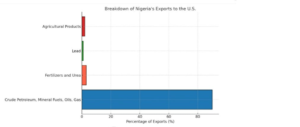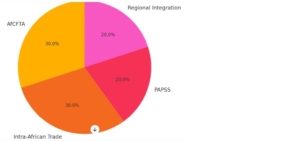The Federal Government of Nigeria has acknowledged the recent tariff measures announced by the Government of the United States of America, which includes imposing a 14% tariff on Nigerian exports. While this development poses challenges for global trade, Nigeria remains committed to strengthening economic resilience and accelerating its export diversification, under the leadership of President Bola Ahmed Tinubu and the Renewed Hope Agenda.
Over the past two years, Nigeria’s exports to the United States have consistently ranged between $5–6 billion annually, with over 90% of these exports being crude petroleum, mineral fuels, oils, and gas products. This trade relationship, while beneficial, is under threat due to the new U.S. tariff measures, especially for Nigeria’s non-oil exports.
A closer look at Nigeria’s export categories to the U.S. reveals a heavy dependence on oil. However, the imposition of tariffs—especially on non-oil products, which were previously exempt under the African Growth and Opportunity Act (AGOA)—could disrupt these growing sectors. Categories such as fertilizers and urea, which account for 2-3% of Nigeria’s total exports, as well as smaller quantities of agricultural products, are now at risk. These industries face challenges related to price competitiveness and market access, particularly as the U.S. implements a new 10% tariff on key export categories. This shift puts a strain on businesses in the non-oil sector, which had been seeing growth in value-added exports.

In response to the U.S. tariff measures, the Federal Government of Nigeria has initiated a range of interventions to ensure that Nigerian businesses remain competitive. These efforts are centered on diversifying exports, improving quality assurance, and strengthening market access. By investing in policy, financing, infrastructure, and diplomacy, Nigeria aims to mitigate the impact of rising tariffs and open up alternative market access opportunities. One of the key strategies involves ensuring off-take diversification, which will reduce risks associated with the volatility of global trade.
SMEs, which had been operating with the benefits of AGOA exemptions, now face significant challenges. However, Nigeria is committed to improving the quality, control, and traceability of its exports, allowing businesses to meet global standards and expand into new markets. This focus on diversification is crucial in achieving a resilient economy that relies less on oil exports and more on a broad base of non-oil sectors.
Recognizing the urgency of this situation, Nigeria is also focusing on strengthening intra-African trade as a vital component of its strategy. By enhancing regional integration through the African Continental Free Trade Area (AfCFTA) and leveraging frameworks like the Pan-African Payment and Settlement System (PAPSS), Nigeria is working to lower trade costs and promote trade within Africa. This shift toward regional cooperation is critical not only for mitigating the impact of global tariffs but also for reinforcing Nigeria’s economic growth within Africa’s dynamic market.

The Federal Ministry of Industry, Trade and Investment is committed to these strategic measures and is optimistic about the future. Dr. Jumoke Oduwole, the Honourable Minister responsible for Nigeria’s trade policy, emphasized, “The Federal Ministry of Industry, Trade and Investment is approaching this moment with pragmatism and purpose—turning global and regional trade policy challenges into opportunities to grow our non-oil export footprint and build a more resilient economy.”
Through these concerted efforts, Nigeria is confident that it will not only navigate the current challenges posed by the U.S. tariff measures but will also emerge stronger, with a more diversified and resilient economy. The country remains committed to furthering economic ties with the U.S., other global partners, and, importantly, strengthening its regional trade through the AfCFTA to support mutual growth.








